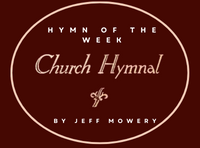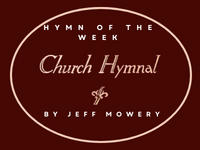Psalm 23
The God of love my shepherd is,
And He that doth me feed:
While He is mine, and I am His,
What can I want or need?
He leads me to the tender grass,
Where I both feed and rest;
Then to the streams that gently pass:
In both I have the best.
Or if I stray, He doth convert
And bring my mind in frame:
And all this not for my dessert,
But for His holy name.
Yea, in death’s shady black abode
Well may I walk, not fear:
For Thou art with me; and Thy rod
To guide, Thy staff to bear.
Nay, thou dost make me sit and dine,
Ev’n in my enemies sight:
My head with oil, my cup with wine
Runs over day and night.
Surely Thy sweet and wondrous love
Shall measure all my days;
And as it never shall remove,
So neither shall my praise.
Written in the 1600’s by George Herbert, this hymn is an adaption of Psalm 23. For centuries in the church, the psalms were sung in Hebrew, or Greek, or Latin. However, as part of the Reformation, Christians began to write hymns in their own words and in their own languages. The goal was not to supersede Scripture, or to reinterpret the Bible. But the goal was to build a hymn with rhyming verses that could be easily memorized, put to music and sung by a congregation in worship. This practice was common in early hymnody. For example, Luther’s “A Mighty Fortress is our God” is an adaption of Psalm 46. It was originally titled “Ein feste Burg ist unser Gott” in Luther’s native German. (And I thought that meant “really good hamburger”).
This particular song was a hymn adaptation by George Herbert – a Welsh-born English poet, orator and Anglican priest. Herbert was, at one time, in the running to be an Ambassador or Secretary of State by King James 1 (Yes, of King James Version Bible fame). George Herbert died at the age of 39 from tuberculosis.
What I like about these kinds of hymns is that they can take a very familiar passage in the Bible, modify them, and still preserve both the original theme of the text, and yet cause us to think a little deeper as well. I personally think this hymn does just that in a beautiful way. I also like the “King James” English that it is written in.
Couple of comments on the lyrics:
- “He that doth me feed” – This phrase made me think about how a shepherd feeds his sheep. Sometimes, a lamb may have trouble nursing. Does the shepherd abandon the lamb and leave it on it’s own? No, he has to come up with a better solution. Maybe even bottle feeding. But after a lamb has grown and no longer needs milk, does the shepherd bottle feed or hand feed them any longer? No, the shepherd provides grass or takes the sheep to a pasture where they can feed and get stronger. So, how does the Good Shepherd feed you? At one point in your Christian walk, He gave you the milk. But as you have matured in your faith and grown stronger, He still feeds you, but now He feeds you the meat of the Word. Aren’t you glad the Shepherd doth still feed?
- “And all this not for my dessert” – How do you define dessert? Something sweet. Something pleasurable you eat at the end of the meal. Banana pudding. Chocolate cake. Mint Chocolate ice cream. Anybody getting hungry? How many times have your told your kids or grandkids, “You can’t have dessert until you eat your dinner.” This phrase reminds me that not everything the Lord puts into my life is for my pleasure – for my dessert. I am not on this earth just to satisfy my cravings. Often times, He puts in our life “veggies.” Things that are necessary for our development. Things that will make us grow stronger in our faith. It would be neglectful to give a child only dessert for 3 meals a day for their entire life. God desires for us to eat the meat of the Word, not just dessert, and that is what He gives us sometimes.
In the 1600’s, the disease tuberculosis had a different name. It was commonly known as “consumption.” In looking at George Herbert’s biography online, one particular author said he died of “consumption.” I really thought that was an odd name for a disease. It was called consumption because the effects of tuberculosis were severe weight loss, and the infection seemed to consume the patient.
I wondered to myself. Won’t all of us die of consumption one day? No, I am not talking about dying from tuberculosis. No, I am not talking about consuming too many desserts. That might contribute to it, but I have never heard of someone dying from too much Moose Tracks ice cream. But won’t we all be consumed either by sin that leads to death, or consumed by the love and forgiveness of God?
Paul writes about the enemies of the Cross in Phillipians 3 and here’s what he says about them “….Whose end is destruction, whose God is their belly, and whose glory is in their shame, who mind earthly things.” These individuals will be “consumed” one day. In Matthew 3, Jesus talks about chaff being burnt up with an unquenchable fire.
But those in Christ do not have that same fate. 2 Corinthians 5 says that our “mortality may be swallowed up by life.” Old things pass away – will be consumed. Behold all things will be made new.
I am thankful for the Good Shepherd. For He leads. Guides. Directs. Feeds. Restores. Anoints. and Blesses. I also recognize that we serve an all-consuming God – “For the Lord your God is a consuming fire, a jealous God. (Deut 4:24). He desires our worship, our lives, and our all.

